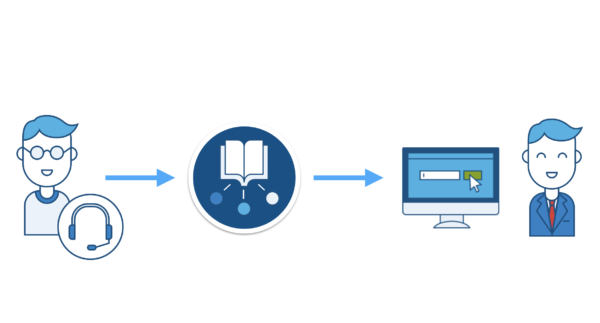7 knowledge management tips to improve your service desk
Every day, service desk agents rely on various knowledge to solve customer problems. Whether it’s located in a document or stored in someone’s brain, that knowledge helps resolve issues and provide consistent answers. But how well are teams managing their knowledge base? Do articles go stale? Is information silo’d with senior agents? Do all agents and customers have easy access to that knowledge?
As the single point of contact for customers, the service desk is the face of IT. With services becoming more complex, agents now have to keep up with the range of technologies and procedures needed to effectively support customers. This makes knowledge management more important than ever. Not only does knowledge improve service quality, but it lowers the overall cost of support by boosting productivity.
Here are 7 ways your service desk team can improve knowledge management:
1. Find out where your knowledge is and centralize it
As technology evolves, knowledge will exist in more and more disparate places. Information gets stuck in email, social media interactions, forum discussions, comments, tickets, and even in the brains of individual service desk agents. If you don’t already have one, aggregate your knowledge in a single repository or system as an easy solution. Centralizing all of that content accelerates learning and helps your team make better decisions. If one person holds knowledge about a particular system, have them document it. If customers are commenting about a service, update your documents with that feedback. If your team receives multiple common tickets, create an article about the topic.
Put simply, having a knowledge base to work from helps agents respond to and resolve issues faster.

2. Make your knowledge accessible and actionable
Resolving incidents faster means being able to find the information you need. Whether your knowledge base is confined to agents or available to customers, make sure your system is easy to update. That way, agents can flexibly refresh content and empower the team with better solutions. Not only does this improve your First Contact Resolution, but it can also reduce cost per contact.
3. Make knowledge management part of your workflow
We all know that carving out time for articles is hard to do when you’re fighting fires. In an ideal world, creating and updating knowledge should be part of every agent’s job. This is one of the core facets to knowledge-centered support. Craig Samuel, HP’s Chief Knowledge Officer, says that knowledge sharing is not a technology issue. In his estimation, work processes and cultural issues account for 90% of problems1. An effective knowledge management practice is about cultivating a culture of collaboration—shifting from a focus on the individual, to a focus on the team.
One way of making knowledge part of your team’s process is to ensure that articles are written before changes are implemented. When a new service is transitioned into production, documentation is available to help facilitate adoption and prevent incidents.

4. Keep information current to speed up agent onboarding
The time it takes to train new agents can become costly. One way to get people to deliver value quicker is to always have up-to-date knowledge accessible for your team. Your team can do this by having agents refine articles as they use them. This means that your knowledge base reflects the team’s collective experience to date.
5. Allow customers and agents to give feedback
Is your knowledge actually helping? Customer feedback is the best way to fine-tune your content to deliver the best answers. Without feedback, you’re shooting in the dark. This could be as simple as a “thumbs up,” or as rich as a comments section. Either way, a feedback loop drives the quality and performance of your knowledge.

6. Deflect tickets with self-service
Not only is knowledge management critical for agents, but it’s also important to customers. 60% of consumers use web self-service to find answers to their questions2. If knowledge isn’t optimally collected and shared, customers will simply go somewhere else for answers. Why not allow them to search for answers from a customer portal or Intranet? Enabling self-service both satisfies customers and frees up time for your team. In fact, the results of applying knowledge-centered support can mean up to 50% incident deflection3.
7. Measure to improve business performance
How does your knowledge add value to your organization? Which articles are being utilized the most? Measuring knowledge is the first step towards improving your team’s performance. Metrics to consider include: the number of articles attributed to First Contact Resolution, the number of articles created and updated by the team, the number of articles utilized by the team, and the number of incidents with article links.

Knowledge management is the key to a high-performing service desk. It also stimulates a culture of innovation. As John Maxwell famously notes, “Change is inevitable, growth is optional.”
What are some innovative ways your team works with knowledge?
Sources:
1. HDI Support Center Manager Student Manual
2. http://blogs.forrester.com/kate_leggett/13-01-14-forresters_top_15_trends_for_customer_service_in_2013
3. http://www.thekcsacademy.net/kcs/
4. http://www.theitsmreview.com/2013/08/knowledge-management-spreading-word/